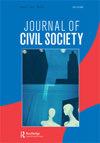Exclusivity of citizens’ initiatives: Fuel for collective action?
IF 0.9
Q3 POLITICAL SCIENCE
引用次数: 4
Abstract
ABSTRACT Self-organized citizens’ initiatives are a form of collective action and contribute to society through the production of public goods and services. Traditional collective action theory predicts that such initiatives are near impossible because of the persistent problems of free-riding. Citizens’ initiatives however do exist and function properly, and their numbers seem to be increasing in countries such as the Netherlands. This article argues that free-riding problems can be overcome when some form of exclusivity is arranged in citizens’ initiatives. We assume that citizens’ initiatives use active and/or passive strategies to limit free-riding behaviour. Using three illustrative cases, our research shows that position rules, boundary rules, and authority rules are used in a subtle and often implicit way to differentiate the level of influence and authority between the more and the less committed members, enabling collective action. Such rules, though advantageous, may be paradoxical to the goals of the citizens’ initiatives and can undermine the virtues associated with them.公民倡议的排他性:集体行动的燃料?
自我组织的公民倡议是一种集体行动形式,通过生产公共产品和服务为社会做出贡献。传统的集体行动理论预测,由于搭便车的问题持续存在,这种举措几乎是不可能的。然而,公民倡议确实存在并正常运作,在荷兰等国,公民倡议的数量似乎在增加。本文认为,如果在公民的倡议中安排某种形式的排他性,就可以克服搭便车的问题。我们假设公民的倡议使用主动和/或被动策略来限制搭便车行为。通过三个例证案例,我们的研究表明,立场规则、边界规则和权威规则以一种微妙且往往隐含的方式被用来区分忠诚程度较高和不忠诚的成员之间的影响力和权威水平,从而实现集体行动。这些规则虽然有利,但可能与公民倡议的目标相悖,并可能破坏与之相关的美德。
本文章由计算机程序翻译,如有差异,请以英文原文为准。
求助全文
约1分钟内获得全文
求助全文

 求助内容:
求助内容: 应助结果提醒方式:
应助结果提醒方式:


